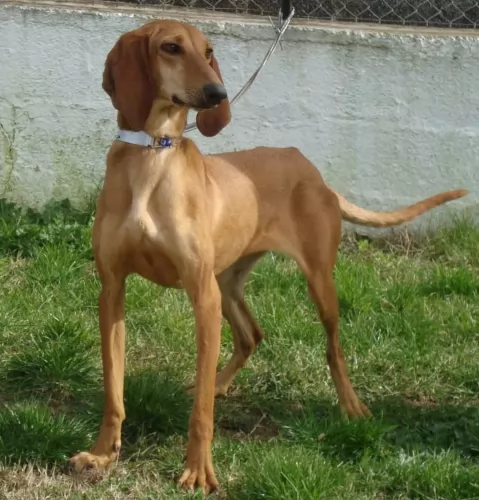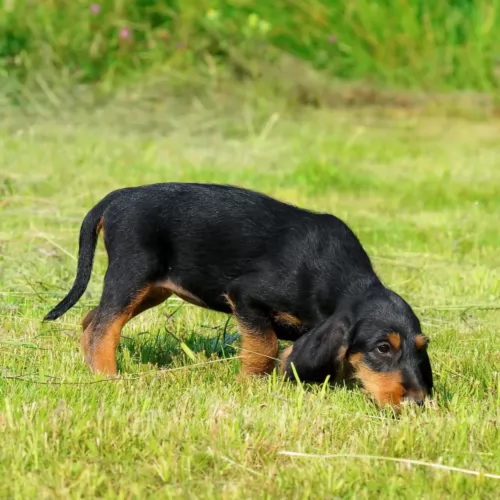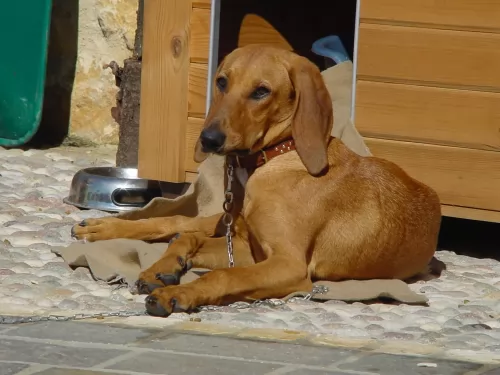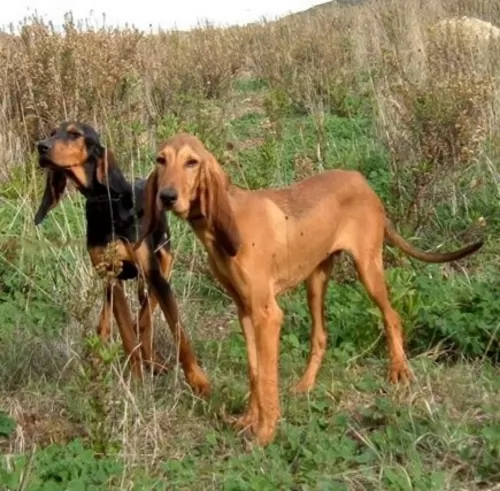 Petzlover
Petzlover Galgo Espanol is originated from Spain but Segugio Italiano is originated from Italy. Galgo Espanol may grow 9 cm / 3 inches shorter than Segugio Italiano. Both Galgo Espanol and Segugio Italiano are having almost same weight. Both Galgo Espanol and Segugio Italiano has almost same life span. Both Galgo Espanol and Segugio Italiano has almost same litter size. Both Galgo Espanol and Segugio Italiano requires Low Maintenance.
Galgo Espanol is originated from Spain but Segugio Italiano is originated from Italy. Galgo Espanol may grow 9 cm / 3 inches shorter than Segugio Italiano. Both Galgo Espanol and Segugio Italiano are having almost same weight. Both Galgo Espanol and Segugio Italiano has almost same life span. Both Galgo Espanol and Segugio Italiano has almost same litter size. Both Galgo Espanol and Segugio Italiano requires Low Maintenance.
 Galgo Espanol means Spanish with galgo meaning greyhound, thus a Spanish Greyhound. This breed is ancient with their roots in perhaps the English greyhound and others in the sighthound family. They are much like the greyhound in that they are laid back, calm, gentle and quiet, unless they are competing on the local track. Like the greyhound they are shy and reserved; great with kids and other pets. And of course, they love cats.
Galgo Espanol means Spanish with galgo meaning greyhound, thus a Spanish Greyhound. This breed is ancient with their roots in perhaps the English greyhound and others in the sighthound family. They are much like the greyhound in that they are laid back, calm, gentle and quiet, unless they are competing on the local track. Like the greyhound they are shy and reserved; great with kids and other pets. And of course, they love cats.
There are dogs like the Galgo referred to in writing by the ancient Celts and Romans. One author, Arrian, had his own Galgos and used them when hunting. The breed flourished in the second half of the Middle Ages in Spain and well into the 8th century. When the Christians regained control of the Iberian Peninsula, they did away with the hunter old forms of hunting and introduced a new form with hounds that made the Galgo the pride of the aristocracy and not in the homes of the ordinary people. Arrian claim to two types of dogs, the smooth and rough coated.
Muslim and Chrisitan Kings kept Galgo Espanols. In all probability the Saluke and Galgo were crossbred at this time. It was illegal to kill a Galgo and in 1081, the Mayor of Cartuario of Slonza left his Galgo in his will to Diego Citid. Dogs seen in painting from the 12th century look just like dogs of this breed who can be seen today.
It is believed that when the Galgo was developed, it was in the midsection of Spain or the Castillian plains. They ruled the interior of the country while the bloodhound ruled the exterior. The 18th and 19th centuries saw very little change in the breed. However, in the 20th century, there was cross breeding with the English greyhound that produced a leaner, faster and powerful track racing dog. The results was a faster dog without the long distance stamina of the pure Galgo. For this reason, the breeders returned to breeding the pure professional racing dog.
The sport of racing the Galgo earns Spain around sixty million dollars per year. They train anywhere from three to four thousand of the Galgos every year for Open Field Coursing Championships. Still, there no longer is any cross breeding between the Greyhound and the Galgo. The current coursing programs feature a hare that is much hardier and difficult to pursue so the stamina of the old Galgo Espanol is desired. In Castile, where these games are played, the landscape is open with large fields that requires that the hare travels far greater distances. This means that the stamina of the original Galgo Espanol is needed.
When not racing the Galgos have become great house pets. They have a reputation as gentle dogs that are docile and quiet, with good health. This reputation is well earned. They are also successful show dogs in Europe much more than the states. This is perhaps because they are really rare outside of Spain. They are not recognized by the United Kennel Club nor the American Kennel Club.
 Known also as the Segit, the Segugio Italiano is an ancient dog breed believed to have descended from Egyptian hounds.
Known also as the Segit, the Segugio Italiano is an ancient dog breed believed to have descended from Egyptian hounds.
Both males and females stand at between 48 and 58cm and they weight between between 18 and 28kg. It’s a medium to large sized dog. The dog is a scenthound and was at first used for wild boar hunting in ancient times. Once wild boar numbers become much less, the Segit itself dropped in numbers, and it faced extinction.
Dedicated houndsmen worked hard to restore the numbers and the dog was successfully bred. It is a popular dog in Italy today. The Segugio Italiano isn’t recognized by the American Kennel Club whereas the Kennel Club in the UK recognizes it in the Hound Group.
 Obviously the Galgos looks a lot like the Greyhound, but in some very important ways they are very different. The rear of the Galgos is higher than the front and their muscle are flatter. They are built for endurance while the Greyhound is built for speed. The Galgos is a lighter, smaller dog with larger ear on a long head. They have long tails and their chests are not deep like the Greyhounds.
Obviously the Galgos looks a lot like the Greyhound, but in some very important ways they are very different. The rear of the Galgos is higher than the front and their muscle are flatter. They are built for endurance while the Greyhound is built for speed. The Galgos is a lighter, smaller dog with larger ear on a long head. They have long tails and their chests are not deep like the Greyhounds.
The Galgo comes in smooth and rough coats and a variety of colors. The rough coat protects dogs that are in climates colder than the ones in Spain and also keeps them from injuring their skin while running. The colors include brindle, black, golden, toasted, cinnamon, yellow, red, white, white with patches, or any color as long as they have a white forehead and muzzle.
 The Segugio Italiano has a distinctive look to him. He’s a large dog standing at between 68 and 76cm in height and weighing between 16 and 27 kg.
The Segugio Italiano has a distinctive look to him. He’s a large dog standing at between 68 and 76cm in height and weighing between 16 and 27 kg.
The body is lean and muscular and the Italian Scenthound has an amicable looking expression on his face. The coat of the dog is available in two types - short-haired or wire-haired.
The short-haired variety needs to be brushed on a weekly basis but is generally easy to maintain. Wire-haired dogs may require hand-stripping several times a year.
The coat of these dogs range from deep red to wheaten or black. Many dogs have white markings on the head, chest, feet, and the tip of the tail. The ears are long and floppy. If you want your dogs to have puppies, you can expect a litter size of between 4 to 6 puppies.
As a Scenthound, the Segugio Italiano is an intelligent dog, easily trained. He is best trained and socialized as he tends to be stubborn and he is also an independent strong-willed dog. It’s not an aggressive dog and yet it makes a good watchdog.
He’s adaptable but wouldn’t adjust well to living in a small space in the city.
 They are good with children, but you need to be careful no one gets knocked down or hurt.
They are good with children, but you need to be careful no one gets knocked down or hurt.
Stamina for running and a good record in lure coursing.
Though they can be couch potatoes like greyhounds they are better off with a fenced yard and not an apartment.
They are smart and can learn anything you want to teach them if you can keep their attention.
 The amicable Segugio Italiano just wants to please. They get on well with children and pets. They’re easy going dogs that will require a good deal of exercise.
The amicable Segugio Italiano just wants to please. They get on well with children and pets. They’re easy going dogs that will require a good deal of exercise.
They make wonderful pets and companions, being particularly well suited to outdoor type of people. They make good watchdogs too, and with his interesting looks, his intelligence and gentle nature, you’re going to have an exceptional canine companion.
 Being a large dog, the Galgo Espanol would normally face a high probability of hip dysplasia. Fortunately for the breed this is not true. In this respect their lightness of weight, their history as a working dog and their anatomy have protected them from it. They are however susceptible to other issues.
Being a large dog, the Galgo Espanol would normally face a high probability of hip dysplasia. Fortunately for the breed this is not true. In this respect their lightness of weight, their history as a working dog and their anatomy have protected them from it. They are however susceptible to other issues.
Malignant tumors that quickly spread throughout the body. Life threatening.
As a sighthound, the Galgo Espanol is prone to have issues anytime with anesthetics. They don’t metabolize the anesthetics like other dogs do. They will take longer to revive, and they are susceptible to hypothermia while under an aesthetic.
While running, they are prone to injuries
 When you have a Segugio Italiano, you’re not likely to be spending much money at the vet, as these dogs are fairly healthy.
When you have a Segugio Italiano, you’re not likely to be spending much money at the vet, as these dogs are fairly healthy.
If your pet does show signs of illness, as a responsible pet owner it is your job to get him pet to the vet quickly as this can prevent other problems developing.
Dogs with such long ears can be more prone to ear infections. Your pet can be in pain and he will shake his head and paw at the infected ear. He may also be vomiting from nausea. You need to get your dog to the vet as soon as possible because with severe ear infection cases, there can even be facial nerve damage.
 Feed your puppy a high quality dry food made for large breed dogs. Feed 3 meals a day 2.5 to 3 cups total for the day.
Feed your puppy a high quality dry food made for large breed dogs. Feed 3 meals a day 2.5 to 3 cups total for the day.
Feed your adult Galgo a high quality dry food made for large breed dogs. Feed 2 meals a day but don’t overfeed Give 4-5 cups total for the day.
They have amazing stamina and good speed. Generally good health as a breed.
He can be a couch potato indoors and runs forever outdoors. He does need daily exercise and bedrest both. The best would be if you could sprint him every day or have a small yard he can play in. They excel of course at agility and lure coursing. Keep them on a leash because if they run you will never catch them. The American Sighthound Field Association presents lure coursing events that they are eligible for. They have exceled at show competition in Europe but are not well known in the U.S.
 The Segugio Italiano comes with two coat types, the short-haired variety as well as the wire-haired variety. The short-haired dog will need to be brushed at least twice a week, while the wire-haired dog may require hand stripping.
The Segugio Italiano comes with two coat types, the short-haired variety as well as the wire-haired variety. The short-haired dog will need to be brushed at least twice a week, while the wire-haired dog may require hand stripping.
Segugio Italianos love a good bout of exercise, and out on the hunt they are constantly on the move. They’re known for their stamina, but once back at home, they can settle down quite calmly. Make sure this pet of yours is well exercised, whether walks, running off his leash or ball games.
Have a good look at the size of your dog, his age and energy levels before choosing dog food. When feeding your dog, don’t make it all complicated. All your dog wants is a simple, nutritious meal.
There are good commercially manufactured dog foods on the market and by reading the labeling you can ensure the best kibble for your pet. Try and give him some home made food too.
Boiled chicken, brown rice or pasta and spinach, sweet potatoes and carrots are a healthy choice for your pet – simple, tasty and nutritious. You can add a little bit of this twice a week to the dry kibble. Your dog will love it and it won’t cause any digestive problems.